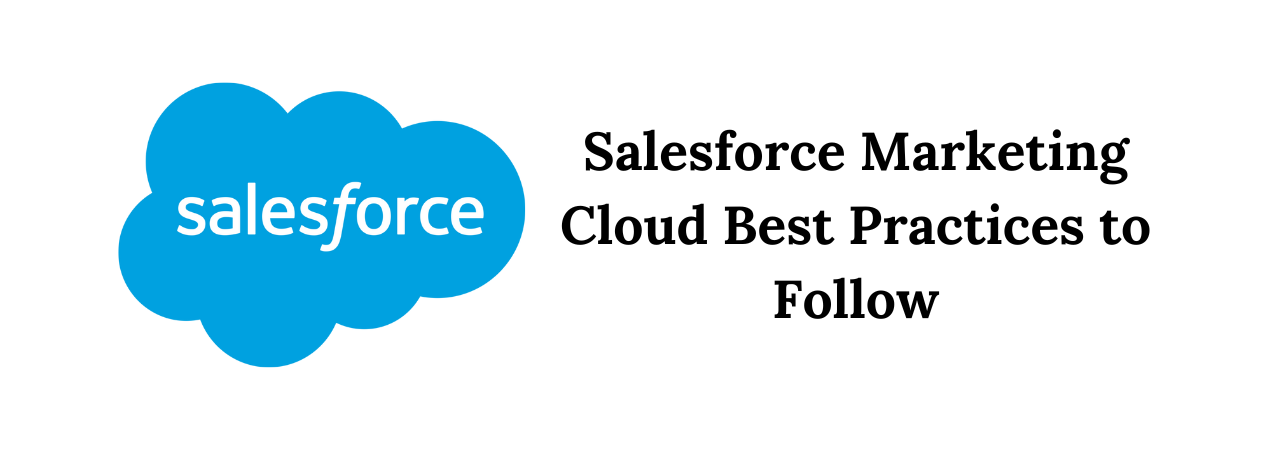
Salesforce Marketing Cloud (SFMC) is a “simple-to-use” eMarketing Software that enables a consistent and smooth experience along each touchpoint of the customer with the help of integrated marketing tools such as Journey Builder, Email Studio, Mobile Studio, Advertising Studio, and Data Studio to name a few. It allows you to know the customers and personalize their experience to increase engagement but understand that SFMC is not a CRM system but a Marketing Automation tool. It owes the immense popularity to the ease with which marketers could build, deploy, and analyze the email campaigns barring any technical skills or complicated hardware systems.
With all that said, let’s delve deeper into the best practices that you should follow when it comes to using SFMC.

Account Set-Up:
- Keep in mind that every contact will be counted as a contact whether you send to them or not.
- Use accelerators to understand how the system will work for you.
- Enable enhanced FTP to ensure the highest level of security and facilitate the automation of data import processes.
- Have two admin accounts so that you can have one account as a failsafe option in case of any inadvertent circumstances.
- Utilize Roles and Permissions to make sure only authorized users have access to Marketing Cloud features.
- If SAP is purchased and activated, warm up the IP correctly before sending bulk emails.
- Use notification services to get instant alerts and resolve the issues.
- Get accustomed to reading validation errors for quick amendment of errors.
Email and Content Builder:
- Have a folder structure and naming convention in place to organize content builder assets.
- Import the content that you need rather than importing everything together.
- Host the images in content builder for best performance.
- If AMP Script is used for personalization, the attribute ought to have a default value.
- It is not recommended to use SSJS scripts within emails since their performance is slow. Instead, use AMPScript/GTL to achieve the desired functionality.
Data:
- Create data extensions by using primary keys to enable performances and apply indexes to the data.
- Always work in TLS and secure your code as you are dealing with confidential information.
- Unless the audience size is too small (<10,000), utilize data extensions to store contact data. The reasons being, they are scalable and query activity can be used to perform advanced segmentation. API calls can be used for advanced integration and the performance is better compared to lists.
- If there are multiple campaigns running with different segments, it’ll be useful to have a naming convention and folder structure setup.
- If the data is being manually imported and cleaned, then it is best to use Automation Studio to automate this process using import activity and SQL queries.
- If Journey Builder is used for any type of engagement flows, a correct data model has to be in place in Contact builder to map out all the relationships between various data extensions.
Journey Builder:
- Understand that journey builder is not suitable to implement a high-volume prospecting email campaign with speedy delivery.
- Typically, you can build a longer-term sales cycle through this tool.
- It is not recommended to combine multiple business goals into a single journey. Instead, split the journeys to make the flow manageable.
- It is a good practice to have an exit criterion in place so that a contact can exit the journey when specific conditions are met.
- Utilize the goal feature of the journey but note that there can only be a single goal per journey.
Analytics:
- Even though SFMC has a brief performance overview within Email Studio and there are multiple reports that can be run from within the Analytics Builder, sometimes business processes require custom reports to be run.
- In such case, it is useful to have last 6 months/1-year data being backfilled into the tracking data extensions using either Data factory Utilities (to export data outside SFMC) or SQL queries (to manipulate data within SFMC)
- Use Discover report templates (if enabled in account) to further drill down into the data.
- Keep a close eye on the fields you specify in your URLs to make sure you are not sending any Personal Identifiable Information or Personal Health Information in the URL query parameter.
- Your fields should never reveal the customer data as URLs and query platforms are quite vulnerable to security breach.
Wrapping Up:
Salesforce Marketing Cloud helps to unify first-party marketing data and expand it with second- and third-party data sources. Consequently, you can align your marketing strategy to your business objectives and drive customer loyalty which ultimately leads to business growth.
We hope these best practices will make it a breeze for you to empower the implementation of Salesforce Marketing Cloud.

